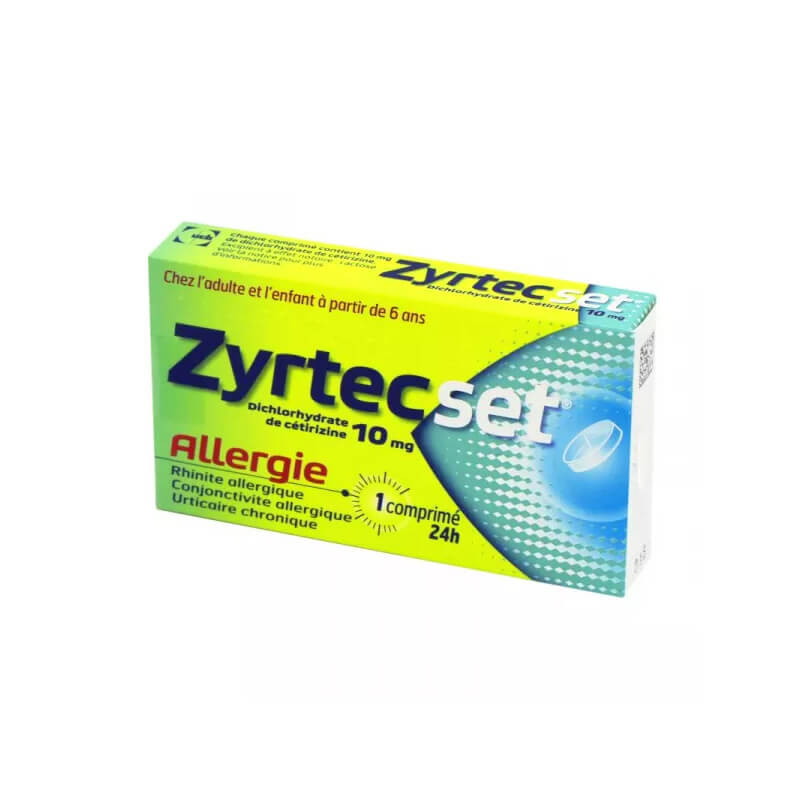
Naturactive PHYTO Black Radish 200mg 60 capsules
Indications: Contains a concentrated extract of black radish.
Free delivery for orders over 89€*.
* in metropolitan France and excluding drugs


Description: Zyrtecset® is a medicine used in the treatment of allergy indicated in adults and children from 6 years.
Its active substance is cetirizine dihydrochloride.
One box contains 7 white scored film-coated tablets
Zyrtecset® is a medicine used in the treatment of allergy(1) indicated in adults and children from 6 years of age.
Its active substance is cetirizine dihydrochloride.
One box contains 7 white film-coated tablets
Zyrtecset® is indicated (2) :
- in the treatment of nasal and ocular symptoms of seasonal and perennial allergic rhinitis.
- in the treatment of symptoms of chronic urticaria (chronic idiopathic urticaria). Medical advice is recommended for chronic idiopathic urticaria.
How and when should you take Zyrtecset®?
These instructions should be followed unless your doctor has given you different instructions on how to use Zyrtecset®. Follow these instructions, otherwise Zyrtecset® may not be completely effective. The tablets should be swallowed with a drink.
Adults and adolescents over 12 years of age:
10 mg once daily, i.e. 1 tablet.
The use of the tablet form is not recommended in children under 6 years of age as this form does not allow for dosage adjustment in this age group.
Children 6 to 12 years of age:
5 mg twice daily, i.e. half a tablet twice daily.
Elderly:
No dosage adjustment is necessary in elderly patients with normal renal function.
Moderate to severe renal impairment
In patients with moderate (creatinine clearance between 30 and 49 ml/min) to severe renal impairment (creatinine clearance between 1 and 30 ml/min) the dose should be reduced to 5 mg once daily and 5 mg once every other day respectively.
In case of severe kidney disease, please consult your doctor.
If you think the effect of Zyrtecset® is too weak or too strong, consult your doctor.
Duration of treatment:
The duration of treatment depends on the type and duration of your symptoms and is determined by your doctor
Never take Zyrtecset® 10 mg, scored film-coated tablet in the following cases
- if you have severe kidney disease (severe renal failure with creatinine clearance less than 10 ml/min);
- if you are allergic to the active substance in Zyrtecset® or to any of the other ingredients (excipients), hydroxyzine or piperazine derivatives (related active substances in other medicines)(1).
Specific References
Indications: Contains a concentrated extract of black radish.
Elgydium Clinic Cicalium is a gel specially designed to help treat and heal canker sores and other small oral lesions while relieving pain.
Transipeg 2.95 g powder packets are used to reconstitute a lemon-flavoured drinking solution. This non-prescription medication belongs to the family of osmotic laxatives.
Osmotic laxatives are medications for constipation that help retain water in the intestine and thus change the consistency of stools to make them easier to pass
Medicine recommended in the treatment of gastric or duodenal ulcer, but also in the prevention of duodenal ulcer. In the form of drinkable suspension,
This medicine is used for short-term local treatment of benign painful trauma: strains, sprains or contusions.
Indications: This hypertonic solution of natural origin is indicated in case of blocked nose (cold, rhinitis, sinusitis).
Acti'Rub® Nasal Spray has a TRIPLE EFFECTIVENESS for good nasal hygiene
Carbocisteine Mylan 2% Children's sugar-free syrup, cough, drinkable solution sweetened with liquid maltitol and sorbitol is a medicine to thin bronchial secretions, indicated for coughing up mucus.
This syrup is indicated in case of bronchial congestion, in particular during acute episodes of bronchitis.
Fluimucil 2% sugar-free oral solution is a fluidifier of bronchial secretions, it will facilitate their evacuation by coughing.
Indications
Medicine used for the temporary relief of sore throats and/or temporary hoarseness.
For adults only
Septivon is a local antiseptic solution associated with a foaming agent. It works by destroying bacteria. It is used to clean or treat locally infected skin or skin exposed to a risk of infection.
Packaging: 250 ml or 500 ml bottle
Apaisyl® Mosquito Repellent Lotion Daily Protection immediately and effectively repels mosquitoes for up to 8 hours but also ticks for up to 12 hours.
Meteoxane of the Alphasigma laboratory is presented in the form of capsules and is used to relieve the pains of belly with distensions and/or emission of gas, associated or not with light diarrhoeas.
Indications: Local treatment of pain of muscular and tendinoligamentary origin in adults.
Indications: This medicine is recommended as an adjunctive local treatment of benign trauma (bruises, blows) in adults and children from one year.
Indications: This medication is indicated for the treatment of tobacco dependence to relieve the symptoms of nicotine withdrawal in subjects wishing to quit smoking. This medication may be used in: cases where a smoker is temporarily abstaining from smoking, a smoking reduction strategy as a step towards permanent cessation.
Insect Ecran Moustiques, Guêpes & Frelons is a product to be applied to the skin. It will immediately repel 95% of wasps(Vespula vulgaris) and hornets(Vespa crabo) for up to 16 hours, at a rate of 2 applications per day*.
Dettol Original Hand Wash Gel is designed for cleaning the hands. It acts by leaving it soft and clean. It can be used daily
Indications: Cryotherapy: sprains, dislocations, strains, tears, strains, tendonitis, haematomas, contusions, migraines, light fevers, nosebleeds, dental pain. Thermotherapy: rheumatic pains, lumbago, back pain, neck pain, lumbagos, torticollis. Box of 1 cushion.
Dolodent Gingival Solution is a medicine indicated in case of pain during teething. With its pleasant caramel aroma, Dolodent Gingival Solution combined with massage quickly relieves baby's sore gums.